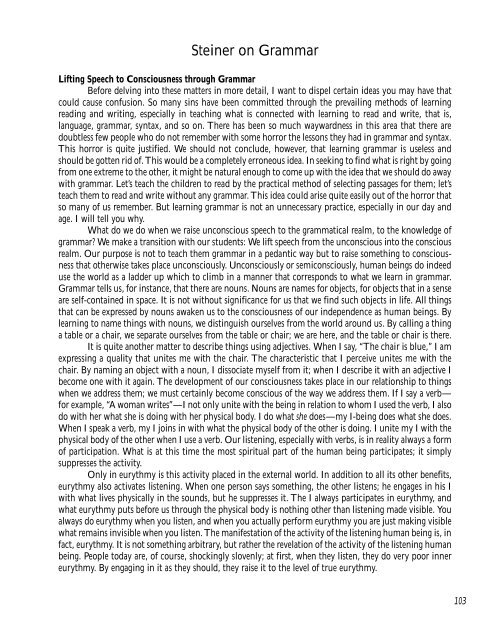Colloquium on English - Research Institute for Waldorf Education
Colloquium on English - Research Institute for Waldorf Education
Colloquium on English - Research Institute for Waldorf Education
You also want an ePaper? Increase the reach of your titles
YUMPU automatically turns print PDFs into web optimized ePapers that Google loves.
Steiner <strong>on</strong> Grammar<br />
Lifting Speech to C<strong>on</strong>sciousness through Grammar<br />
Be<strong>for</strong>e delving into these matters in more detail, I want to dispel certain ideas you may have that<br />
could cause c<strong>on</strong>fusi<strong>on</strong>. So many sins have been committed through the prevailing methods of learning<br />
reading and writing, especially in teaching what is c<strong>on</strong>nected with learning to read and write, that is,<br />
language, grammar, syntax, and so <strong>on</strong>. There has been so much waywardness in this area that there are<br />
doubtless few people who do not remember with some horror the less<strong>on</strong>s they had in grammar and syntax.<br />
This horror is quite justified. We should not c<strong>on</strong>clude, however, that learning grammar is useless and<br />
should be gotten rid of. This would be a completely err<strong>on</strong>eous idea. In seeking to find what is right by going<br />
from <strong>on</strong>e extreme to the other, it might be natural enough to come up with the idea that we should do away<br />
with grammar. Let’s teach the children to read by the practical method of selecting passages <strong>for</strong> them; let’s<br />
teach them to read and write without any grammar. This idea could arise quite easily out of the horror that<br />
so many of us remember. But learning grammar is not an unnecessary practice, especially in our day and<br />
age. I will tell you why.<br />
What do we do when we raise unc<strong>on</strong>scious speech to the grammatical realm, to the knowledge of<br />
grammar? We make a transiti<strong>on</strong> with our students: We lift speech from the unc<strong>on</strong>scious into the c<strong>on</strong>scious<br />
realm. Our purpose is not to teach them grammar in a pedantic way but to raise something to c<strong>on</strong>sciousness<br />
that otherwise takes place unc<strong>on</strong>sciously. Unc<strong>on</strong>sciously or semic<strong>on</strong>sciously, human beings do indeed<br />
use the world as a ladder up which to climb in a manner that corresp<strong>on</strong>ds to what we learn in grammar.<br />
Grammar tells us, <strong>for</strong> instance, that there are nouns. Nouns are names <strong>for</strong> objects, <strong>for</strong> objects that in a sense<br />
are self-c<strong>on</strong>tained in space. It is not without significance <strong>for</strong> us that we find such objects in life. All things<br />
that can be expressed by nouns awaken us to the c<strong>on</strong>sciousness of our independence as human beings. By<br />
learning to name things with nouns, we distinguish ourselves from the world around us. By calling a thing<br />
a table or a chair, we separate ourselves from the table or chair; we are here, and the table or chair is there.<br />
It is quite another matter to describe things using adjectives. When I say, “The chair is blue,” I am<br />
expressing a quality that unites me with the chair. The characteristic that I perceive unites me with the<br />
chair. By naming an object with a noun, I dissociate myself from it; when I describe it with an adjective I<br />
become <strong>on</strong>e with it again. The development of our c<strong>on</strong>sciousness takes place in our relati<strong>on</strong>ship to things<br />
when we address them; we must certainly become c<strong>on</strong>scious of the way we address them. If I say a verb—<br />
<strong>for</strong> example, “A woman writes”—I not <strong>on</strong>ly unite with the being in relati<strong>on</strong> to whom I used the verb, I also<br />
do with her what she is doing with her physical body. I do what she does—my I-being does what she does.<br />
When I speak a verb, my I joins in with what the physical body of the other is doing. I unite my I with the<br />
physical body of the other when I use a verb. Our listening, especially with verbs, is in reality always a <strong>for</strong>m<br />
of participati<strong>on</strong>. What is at this time the most spiritual part of the human being participates; it simply<br />
suppresses the activity.<br />
Only in eurythmy is this activity placed in the external world. In additi<strong>on</strong> to all its other benefits,<br />
eurythmy also activates listening. When <strong>on</strong>e pers<strong>on</strong> says something, the other listens; he engages in his I<br />
with what lives physically in the sounds, but he suppresses it. The I always participates in eurythmy, and<br />
what eurythmy puts be<strong>for</strong>e us through the physical body is nothing other than listening made visible. You<br />
always do eurythmy when you listen, and when you actually per<strong>for</strong>m eurythmy you are just making visible<br />
what remains invisible when you listen. The manifestati<strong>on</strong> of the activity of the listening human being is, in<br />
fact, eurythmy. It is not something arbitrary, but rather the revelati<strong>on</strong> of the activity of the listening human<br />
being. People today are, of course, shockingly slovenly; at first, when they listen, they do very poor inner<br />
eurythmy. By engaging in it as they should, they raise it to the level of true eurythmy.<br />
103

















